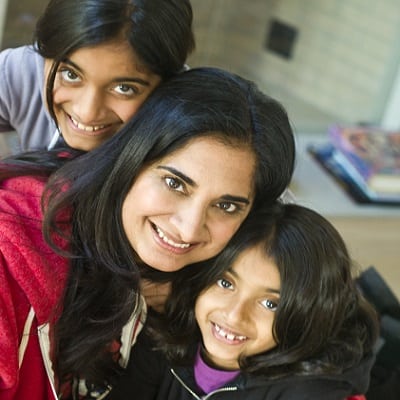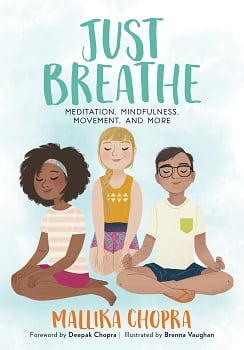
Mallika Chopra poses with her daughters, Tara (left) and Leela. PHOTO BY NORA FRANCIS
An increasing number of schools and studios throughout the country are introducing children to meditation and yoga to help them deal with stress and overstimulation. Mallika Chopra, mom, author and wellness expert, wants these coping tools to be accessible to all children – even outside a workshop or class. With the publication of her new book, she is well on her way to achieving this goal.
Written for 8- to 12-year-olds, the book includes illustrations and a variety of exercises – walking meditations, quiet meditations, walks in nature, gratitude exercises. Using inspiration and knowledge passed on to her by her father, Deepak Chopra, and her own experiences with meditating and introducing it to her two children, Chopra crafted the book as a fun and accessible guide. And though she wrote it to enhance meditation for children, “Just Breathe” is also a breath of fresh air for stressed-out parents.
Why did you write this book for 8- to 12-year-olds?
Kids this age have the ability to process and think about things, and you can address them directly and empower them with the tools to take these practices in their own hands. Giving them the book, rather than walking them through it or lecturing them on the concepts, allows them to make discoveries on their own. This was effective in our family, and I wanted to give other children this opportunity for discovery during this critical stage of emotional [and] social learning and development.
What challenges do 8- to 12-year-olds have in embracing the ideas and practices?
We make assumptions about kids this age that they can’t sit still, or the exercises are daunting for them, but I find the kids acclimate and embrace these practices sometimes easier than adults because they don’t have end goals or need to intellectualize things. They really experience the practices, sometimes with giggles and some self-consciousness, but when the practices are introduced in easy and practical ways, kids seem to get them. 
Do you recommend that children use the book as a solo read or guided by an adult?
Every family is different, and parents hopefully know what’s best for their child, though I don’t believe parents should force children to meditate. This creates unnecessary stress and tension and takes away the fun of this exploration. The goal is to give kids the tools and let them discover what works for them. If they aren’t interested in doing the exercises at this point, with or without a parent, it’s OK. The best thing parents can do is meditate and find their own individual practice. We teach more through examples than words. Expose children to the tools, and they will use them when they need them.
Should kids experience the discomfort that we are often taught comes with establishing a meditation practice?
I would not recommend teaching kids to meditate the same way many adults are taught: by telling them to sit quietly for 15 minutes once a day, to watch their minds wander, to feel discomfort and not judge it, etc. This is asking a lot of kids. Introducing these concepts in short time frames, however, hopefully piques their interests so that as they grow older, they can do the exercises longer and maybe regularly incorporate them into their lives. Meditation is actually simple, but the teaching of it has become complicated. Interestingly, I hear often from adults that they love the book because the instructions and exercises are simple and manageable. If adults are seeking simple techniques to give them a taste of meditation, why complicate it for children?
What are your long-term hopes for this book?
Meditation has many mental and physical benefits, but it ultimately helps us connect with our inner selves. Everything begins always with a personal inner journey, and I think the earlier children, as a humanity, are empowered to pursue this journey, the more hope I have for the future. The power of silence can really be transformational, and research shows meditation increases empathy and conflict-resolution abilities, while decreasing impetuousness when reacting. These are valuable skills. Plus, change happens on smaller scales, so hopefully, if we can start seeing some of the benefits of meditation first within our families, our schools, our communities, then the dream is that this expands.
To learn more about Mallika Chopra, visit mallikachopra.com.
























